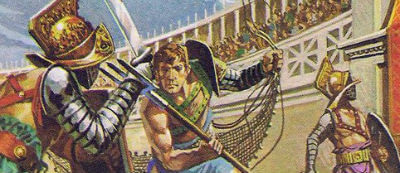We've Been Gambling for Thousands of Years – But How Did it All Begin?

Throughout history as humans we've had a penchant for gambling. Some have made a career out of it and let's face it we all like to take a chance every now and again. Our modern idea of gambling involves games such as poker and roulette, and it's a pastime that takes place in a casino. But not just a land-based casino because there are now thousands of virtual casinos we can visit online. Go back in time as far as you want to and there is recorded evidence or signs that people have gathered together for the sole purpose of gambling. As lovers of ancient civilizations, myths and legends we're going to take a walk back in time and look at some of the ways the ancients gambled.
Where is it thought to have began?
Ancient lottery
Some of the earliest evidence relating to gambling has been found in China. Tiles have been unearthed that appear to have come from Ancient China and it appears they were used for a type of game of chance similar to a lottery type game, and to our modern day game of keno. Slips from around 200BC have been found and it's thought they were used as part of a lottery that helped to pay for state works including the Great Wall of China.
Ancient dice games
Dice games have been a part of culture since the Ancient Greeks. Sophocles, the Greek poet, claimed that dice had been invented by a hero from Greek mythology, during the battle of Troy. Writings by him, from around 500BC are the first examples of dice being mentioned in Greek history. It is known that dice have been around for much longer because a pair were found in an Egyptian tomb, dated from around 3000BC.
The origins of gambling chips
It's the Romans we've got to thank for gambling chips. These came about because while they loved to gamble all forms were forbidden within the ancient city of Rome. Anyone who was caught gambling would have to pay a penalty of four times the stake they were found to be betting. Ever ingenious, and looking for a way to get around this problem while still being able to gamble, Roman citizens came up with the idea of gambling chips. This meant that if they were unfortunate enough to get caught they could claim they were only gambling for chips rather than actual money.
Playing cards are thought to have first appeared in 9th century China
It has been agreed by most experts that playing cards first appeared in China. However, the rules for the games that were played are not quite so certain. It has been suggested that a kind of trading card game is what was played but there are others who think they may have been used for a kind of domino game. One thing is for certain, and that's the fact that the cards were very different from those we use nowadays.
Even the Native Americans enjoy a spot of gambling
Evidence has been found quite recently that suggest ancient casinos were used by Native Americans. A cave in Utah was excavated and what was found suggested its use was as a casino. More than 10,000 objects were found connected to gambling. Examples included carved sticks that would have been used in a guessing game that involved throwing and guessing whether they would land face-up or face-down. It is thought that the sticks were used to assign various day-to-day duties by the women.
Many of the Ancient civilizations believed there were certain gods that had an interest in gambling. The Roman goddess Fortuna, for example, was thought to be the ruler of fortune and chance. She also became the symbol of wealth and prosperity and was called upon by those who were gambling, when making wagers and placing bets. The Greeks also believed that gambling was a gift from the Gods. Zeus, Poseidon and Hades made wagers in order to decide who was given control of different parts of the Universe. Poseidon subsequently won the sea, Zeus the Heaves and Hades won power over the Underworld.
